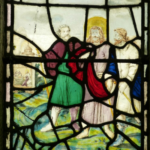Thank you for visiting. We trust that you have enjoyed reading our articles.
Why Are You Asking “Why?”

“I know that you can do anything, and no one can stop you. You asked, ‘Who is this that questions my wisdom with such ignorance?’ It is I – and I was talking about things I knew nothing about, things far too wonderful for me . . . I take back everything I said, and I sit in dust and ashes to show my repentance” (Job 42:2-3, 6 NLT).
I suspect the most common question that people ask God begins with “why.” Why was my house destroyed in the fire? Why am I so unhappy? Why don’t I have more money? We will never fully understand the ways of God, but we take comfort in knowing that God is good. This is the essence of the mystery of faith. It is important to understand that faith is not hoping for something or having a strong feeling about a future event or situation. Faith is based on assurance and conviction as described in Hebrews 11:1. “Now faith is the assurance of things hoped for, the conviction of things not seen.”
We do not understand God because we are not God. For us to try to understand God is as futile as it would be for the birds in my backyard to understand calculus. God addresses the fundamental different between Himself and us in Isaiah 55:8-9. “’For my thoughts are not your thoughts, neither are your ways my ways,’ declares the Lord. As the heavens are higher than the earth, so are my ways higher than your ways and my thoughts than your thoughts.’”
We all struggle with our faith in the midst of a storm. Questions that begin with “why” are a sign of fear rather than faith and trust.
In the first 37 chapters of the book of Job, we read time and again of Job asking God questions that begin with “why.” “Why is this happening to me? Why are you allowing this? Why so much pain? Why so much discomfort? Why haven’t you answered my prayers?” Does this sound familiar?
In chapter 38, Job stops asking “why.” God begins to ask some very difficult question to Job.
In the next two chapters, God asks questions to Job that only God could answer. He asks things like, “Where were you when I made the universe? Can you explain the law of gravity?”
After two chapters, Job realizes that he is just a man, and his knowledge is limited. It appears that Job has had an epiphany and his response is in accordance with Isaiah 55:8-9.
Job stops questioning—and starts trusting. He replies to the Lord, “I know that you can do anything, and no one can stop you. You asked, ‘Who is this that questions my wisdom with such ignorance?’ It is I – and I was talking about things I knew nothing about, things far too wonderful for me . . . I take back everything I said, and I sit in dust and ashes to show my repentance” (Job 42:2-3, 6).
The strength of our faith is revealed when we don’t understand what is happening. Do we choose fear or faith when life doesn’t make sense?
Of course, we all know we should choose faith, but it is not quite that simple in practice. We don’t understand the situation, and we certainly don’t understand God’s thoughts, but we can remind ourselves of the things we do know about God to help us through the storm. As we return back to Scripture, we can learn from Job.
Even while doubting, Job affirmed what he knew to be true about God: God is loving (Job 10:12), God is all powerful (Job 36:22), God is in control (Job 34:13), God had a plan for his life (Job 23:14), and God would protect him (Job 5:11).
You may be experiencing a major problem right now and feel that nobody understands you or your problem, and you may be exactly right! However, you need to realize that the God of heaven and earth understands you and your problem better than you do! If He knows the number of hairs on your head (Luke 12:7), don’t you think He also is passionately and intimately aware of every detail of your life? As His children, we have the Holy Trinity on our side. Jesus Christ is interceding for us to the Father (Romans 8:34). The Holy Spirit is offering intercessory prayer to God through our wordless groans (Romans 8:27). And God is leading the way for us. “The LORD himself goes before you and will be with you; he will never leave you nor forsake you. Do not be afraid; do not be discouraged” (Deuteronomy 31:8).
You may not understand what you’re going through, but you can still say this to God: “I don’t like this, and I don’t understand this, but I know you’re good. I know you’re loving. I know you’re powerful. I know you know the details of my life. I know you’re in control. I know you have a plan. I know you will protect me.”
We mature as Christians when we stop asking “why” and start trusting God—no matter what. There is freedom and peace that comes from trusting God all the time. We are each free to chose faith or fear. Choose wisely.
Prayer: Dear God, You have delivered us from slavery and captivity and made a Holy covenant with us as your children. Your love, wisdom, grace, and providence is impossible for us to understand. Forgive us for our doubt and help us to remember what we know about you. Use these periods of adversity as opportunities to grow our faith and draw us closer in ministry to you and each other until you come again in final victory. Amen.
Meet the Author
Todd Shupe is a Men’s Ministry Specialist through the General Commission of United Methodist Men and is in training to be a Certified Lay Minister through the Louisiana Conference of the United Methodist Church. He currently serves as the President of the Baton Rouge District of United Methodist Men and is a Board Member for Gulf South Men and serves on the Action Team for The Kingdom Group. He is a volunteer for the Walk to Emmaus, Grace Camp, and Iron Sharpens Iron. Todd resides in Baton Rouge, Louisiana.
We welcome your comments below.
Liked this post?
Read more below or search for more topics...
-
The Holy Spirit Meets Us In Our Loneliness
The Holy Spirit Meets Us In Our Loneliness “When the day of Pentecost came, they were all together in one place. Suddenly a sound like the blowing of a violent wind came from heaven and filled the whole house where they were sitting. They saw what seemed to be tongues of fire that separated and came to rest on each of them. All of them were filled with the Holy Spirit and began to speak in other tongues as the Spirit enabled them” (Acts 2:1-4 NIV). We all love Christmas and Easter, but Pentecost is important too because it is the birthday of the bride of Christ, His... -
You Got Questions? So Does God!
You Got Questions? So Does God! “Where are you?” (Genesis 3:9).We all have questioned God when adversity or disappointment occurs. I suspect we all excel at clearly telling God what we want. How many times have you questioned God? When will I get promoted? Why did my good friend die? Where am I going to live when I can no longer care for myself? What does God want from me? Who am I? A teacher encourages their students to learn. Of the 90 times Jesus was directly addressed in the gospels, on 60 occasions He was addressed as “Teacher.” ... -
The Walk to Emmaus: The Best Spiritual Weekend Retreat
The Walk to Emmaus: The Best Spiritual Weekend Retreat "When he was at the table with them, he took bread, gave thanks, broke it and began to give it to them. Then their eyes were opened and they recognized him, and he disappeared from their sight. They asked each other, “Were not our hearts burning within us while he talked with us on the road and opened the Scriptures to us?” (Luke 24:30-32 NIV). The Walk to Emmaus “Walk” is a three-day spiritual retreat that came out of the Roman Catholic Cursillo movement. The Walk to Emmaus is held numerous times during...



